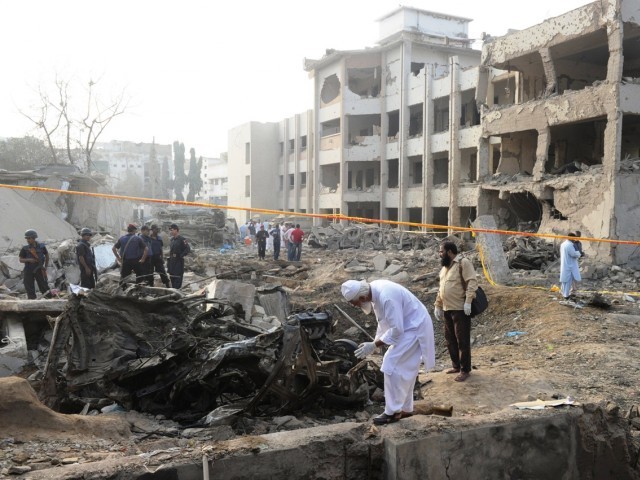
An investigator inspects the wreckage of a vehicle a day after a bomb blast in Karachi on November 12, 2010. PHOTO: AFP
The number of deaths in terrorism-related incidents in Pakistan continues to rise almost everyday. A series, Dispatches, aired on a national channel of Pakistan tracks how cities and their people struggle for survival amidst growing incidents of violence in the country.
“People in the West have no idea what terrorism is,” says Islamabad resident and former General Tahir Malik. “You drop your wife off in the morning and at 2 o’clock you bring a dead body home.”
Malek struggles to cope with the death of his wife, Gulrukh, and four other people in a bomb blast at the World Food Programme office.
“Nothing can prepare you for a death like this… It is something beyond comprehension,” he says, wondering how to explain these shocking events: “We have a 9/11 and a7/7, if not every day, every second day in Pakistan.”
He remembers Islamabad as a quiet capital, not as the city of barbed wire and barricades it is today. City of Fear (22 November, 8pm, C4) tracks the police as they attempt to deal with the bombers, though as the police chief admits, “There is no absolute method for curbing these terrorists,” who are from a variety of groups and who kill without discrimination, compunction or remorse, using materials that can be bought in any market.
And there’s no shortage of recruits for terror attacks, with money and cars (not always delivered, according to one suspect) promised by the handlers.
Police fight the bombers with totally inadequate facilities: the police budget is said to be one-hundredth that of London’s Metropolitan Police. In the firing line themselves, the police are doing their best, but are fighting against the odds.
After a few weeks without a blast a suicide bomber self-destructs in the city’s Islamic University. The female students’ café suffers the worst casualties.
One of the advantages of a programme such as this is that the Dispatches filmmakers can observe people and places over time. It shows the gradual recovery of two students who survived the blast – despite sitting next to a friend who was killed – but you sense that for Tahir, a man of thoughtful intelligence, with as many years behind him as ahead, his whole life has been undermined.
There’s no government compensation or support and, though there are communal religious remembrance ceremonies, no help for dealing with his trauma – “except for close friends, nobody’s really bothered about what’s happened to me.
“People ask, ‘Don’t you believe in God?’ I believe in God but I don’t believe in a God who will bring misery to his people.”
He is trying to set up a support network for victims of the 500 bomb blasts that occurred in 2009 but he is fighting a culture of silent acceptance of the will of God.
He hopes that “slowly, we will be able to make people understand what’s going on. So far nobody knows because nobody talks.”
By sticking around rather than dashing in and out the film crew get interesting interviews and opportunities to observe the police at work, as well as hints of offscreen goings-on, such as interrogation procedures.
Dispatches deserves credit for investing time and money in a programme such as this. It’s worth it, for the glimpses it offers of life in a city under stress from terrorism and particularly for showing us ordinary Pakistanis struggling to deal with the impact of violence.
Source : One World UK

